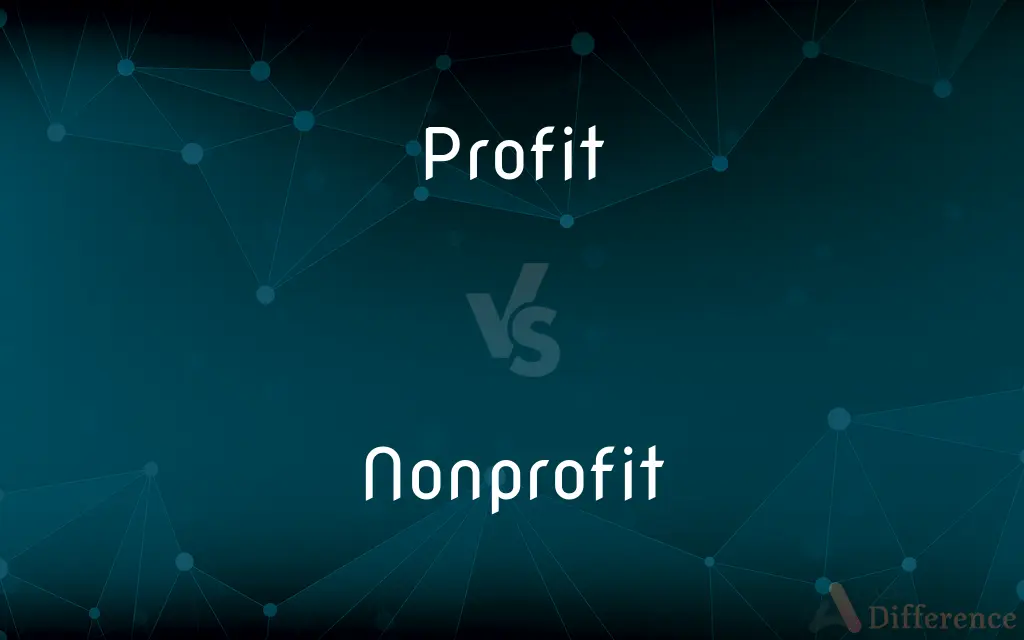Profit vs. Nonprofit — What's the Difference?
By Tayyaba Rehman & Fiza Rafique — Published on October 24, 2023
Profit organizations aim to generate income above expenses for owners or shareholders; Nonprofit organizations focus on social, educational, or charitable goals without distributing excess revenue to individuals.

Difference Between Profit and Nonprofit
Table of Contents
ADVERTISEMENT
Key Differences
Profit organizations primarily exist to create financial gain for owners and shareholders. These organizations often prioritize revenue generation and may be publicly or privately held. Nonprofit organizations, on the other hand, are established for purposes other than financial gain, such as charitable, educational, or social objectives.
Profit organizations often distribute their excess revenue as dividends to shareholders or reinvest it back into the business. Nonprofit organizations, conversely, reinvest any surplus funds back into their mission or cause; these funds are not distributed to individuals for personal gain.
In Profit organizations, the goal is often growth and increasing shareholder value. This might involve expansion, innovation, and aggressive marketing. Nonprofit organizations might also aim for growth, but the growth is usually directed at maximizing the impact on their mission, be it social, educational, or charitable.
From a legal standpoint, Profit and Nonprofit organizations are subject to different tax regulations. Profit organizations pay taxes on income, while many Nonprofits are tax-exempt as long as they operate within the bounds of their mission. Despite these fundamental differences, both types of organizations require efficient management and strategic planning to be successful.
Comparison Chart
Main Goal
Financial gain
Social/charitable mission
ADVERTISEMENT
Revenue Use
Dividends or reinvestment
Reinvestment in mission
Growth Focus
Shareholder value
Mission impact
Tax Status
Taxable
Often tax-exempt
Legal Structure
Corporation, LLC, etc.
501(c)(3), etc.
Compare with Definitions
Profit
Financial Gain
Profit is the money earned above the cost of doing business.
Nonprofit
Charitable Mission
A nonprofit organization is focused on a social or charitable cause.
Profit
Tax Liability
Profit organizations pay taxes on their income.
Nonprofit
Mission-Driven
The primary focus of a nonprofit is achieving its mission.
Profit
Owner's Objective
The main goal of a profit entity is to increase shareholder value.
Nonprofit
Tax-Exempt
Many nonprofits are tax-exempt if they adhere to regulations.
Profit
Business Focus
Profit organizations often focus on market growth and expansion.
Nonprofit
No Shareholders
Nonprofits do not have shareholders and do not distribute dividends.
Profit
Dividend Allocation
Excess revenue in profit organizations may be given out as dividends.
Nonprofit
Surplus Use
Any surplus in a nonprofit is reinvested into the organization's mission.
Profit
An advantageous gain or return; benefit.
Nonprofit
Not seeking or producing a profit or profits
A nonprofit organization.
Profit
Financial gain from a transaction or from a period of investment or business activity, usually calculated as income in excess of costs or as the final value of an asset in excess of its initial value.
Nonprofit
An organization, such as a charity, that does not seek or produce a profit
Donated money to local nonprofits.
Profit
To make a gain or profit.
Nonprofit
Not seeking to produce a profit a financial gain.
Profit
To derive advantage; benefit
Profiting from the other team's mistakes.
Nonprofit
Ellipsis of nonprofit organizationan organization that exists for reasons other than to make a profit, such as a charitable, educational or service organization.
Profit
To be beneficial to
What has all this time in school profited you?.
Nonprofit
Not commercially motivated
Profit
Total income or cash flow minus expenditures. The money or other benefit a non-governmental organization or individual receives in exchange for products and services sold at an advertised price.
Profit
Benefit, positive result obtained.
Reading such an enlightening book on the subject was of much profit to his studies.
Profit
Senseid|en|interest in land}} (property law) {{ellipsis of profit à prendre
Profit
(transitive) To benefit (somebody), be of use to (somebody).
Profit
To benefit, gain.
Profit
To take advantage of, exploit, use.
Profit
Acquisition beyond expenditure; excess of value received for producing, keeping, or selling, over cost; hence, pecuniary gain in any transaction or occupation; emolument; as, a profit on the sale of goods.
Let no man anticipate uncertain profits.
Profit
Accession of good; valuable results; useful consequences; benefit; avail; gain; as, an office of profit,
This I speak for your own profit.
If you dare do yourself a profit and a right.
Profit
To be of service to; to be good to; to help on; to benefit; to advantage; to avail; to aid; as, truth profits all men.
The word preached did not profit them.
It is a great means of profiting yourself, to copy diligently excellent pieces and beautiful designs.
Profit
To gain advantage; to make improvement; to improve; to gain; to advance.
I profit not by thy talk.
Profit
To be of use or advantage; to do or bring good.
Riches profit not in the day of wrath.
Profit
The excess of revenues over outlays in a given period of time (including depreciation and other non-cash expenses)
Profit
The advantageous quality of being beneficial
Profit
Derive a benefit from;
She profited from his vast experience
Profit
Make a profit; gain money or materially;
The company has not profited from the merger
I lost thousands of dollars on that bad investment!
The company turned a loss after the first year
Common Curiosities
Do Profit organizations pay taxes?
Yes, they pay taxes on their income.
What is Nonprofit?
Nonprofit refers to organizations focused on a mission rather than financial gain.
Who owns a Nonprofit organization?
They are generally owned by the community and have no shareholders.
What is Profit?
Profit refers to the financial gain a business makes.
Can Profit organizations give to charity?
Yes, but it's often for tax benefits or public relations.
Can Nonprofits turn a profit?
They can have a surplus, which is reinvested in the mission.
Who owns a Profit organization?
Shareholders or private owners generally own profit organizations.
Do Nonprofit organizations pay taxes?
Many are tax-exempt, but it depends on their activities.
Can Profit organizations have a social mission?
They can, but their primary aim remains financial gain.
How do Profit organizations grow?
They focus on increasing shareholder value through various strategies.
Are Profit organizations globally recognized?
Yes, the concept is widely understood globally.
Can Nonprofits earn revenue?
Yes, but the revenue is reinvested in the organization's mission.
How do Nonprofits grow?
They focus on expanding their mission's impact.
Are Nonprofits globally recognized?
The concept exists globally but may vary in structure and regulations.
Can one person own a Nonprofit?
No, Nonprofits are usually governed by a board and have no owners.
Share Your Discovery

Previous Comparison
Committed Fixed Costs vs. Discretionary Fixed Costs
Next Comparison
MBR vs. MBBRAuthor Spotlight
Written by
Tayyaba RehmanTayyaba Rehman is a distinguished writer, currently serving as a primary contributor to askdifference.com. As a researcher in semantics and etymology, Tayyaba's passion for the complexity of languages and their distinctions has found a perfect home on the platform. Tayyaba delves into the intricacies of language, distinguishing between commonly confused words and phrases, thereby providing clarity for readers worldwide.
Co-written by
Fiza RafiqueFiza Rafique is a skilled content writer at AskDifference.com, where she meticulously refines and enhances written pieces. Drawing from her vast editorial expertise, Fiza ensures clarity, accuracy, and precision in every article. Passionate about language, she continually seeks to elevate the quality of content for readers worldwide.












































